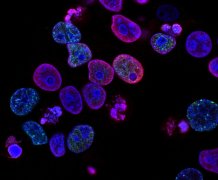
The team used novel drugs being developed at the University of Exeter, which “metabolically reprogramme” mitochondria
New drug molecules hold promise for treating rare inherited terminal childhood disease
Scientists at the University of Exeter have identified a way to “rescue” cells that have genetically mutated, paving the way to a possible new treatment for rare terminal childhood illness such as mitochondrial disease.
The research, funded by the United Mitochondrial Disease Foundation in the USA, was led by Professors Matt Whiteman and Tim Etheridge. In the study, published in the Journal of Inherited Metabolic Disease, the team used novel drugs being developed at the University of Exeter, which “metabolically reprogramme” mitochondria - the cellular energy production centres in cells, by providing them with an alternative fuel source to generate metabolic energy in the form of minute quantities of hydrogen sulfide.
The team used microscopic worms (C. elegans) with specific genetic mutations affecting energy production, that match mutations that cause human diseases such as Leigh Syndrome. The team found that administering the new compounds to these animals successfully normalised or improved energy production needed to keep them healthy and active.
Professor Tim Etheridge, of the University of Exeter, one of the study authors, said: “Worms are a very powerful genetic tool to study human health and disease and offer an ideal platform to quickly identify new potential therapeutics. The worms used in this study had genetic defects in how their mitochondria regulate cellular energy production to model different human mitochondrial diseases. The novel compounds we are developing at the University of Exeter are able to bypass some of these defects and keep the worms, and their mitochondria healthy. We know this because we saw improvements in physical activity and improvements in muscle and mitochondrial integrity. The animals also lived for longer after treatment but more importantly, they remained active for longer, because of metabolic reprogramming.”
The team had previously shown that the compounds had potent therapeutic effects in mammalian models with defective mitochondria. In those studies, the animals’ mitochondria became defective as result of a disease process. In the latest study however, the defective mitochondria were the direct cause of the disease, as in human mitochondrial disease and were still successfully treated with the Exeter compounds. The fact that the compounds could reverse some of these inherited defects in energy metabolism strongly suggest that their effect will translate to humans, and the team is confident this can be tested in the near future.
Lead author Professor Matt Whiteman, of the University of Exeter, said: “Mitochondrial diseases, and their related conditions, are areas of huge and desperate unmet clinical need. Our study is an important first step and a lot of work still needs to be done. For the first time, we have demonstrated that our new molecules have successfully metabolically reprogrammed, or rescued, cells in animals with genetic defects in their mitochondria. We’re currently testing newer and more potent molecules able to do the same task, through slightly different approaches, and we’re looking for commercial partners to help our efforts to progress our molecules through to clinical testing.”
The paper is entitled: The mitochondria-targeted hydrogen sulfide donor AP39 improves health and mitochondrial function in a C. elegans primary mitochondrial disease model”
Date: 18 December 2020
